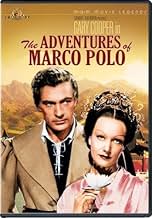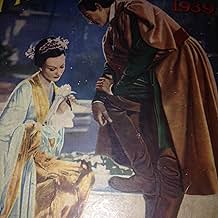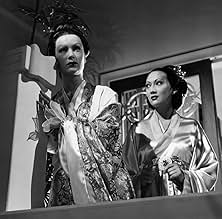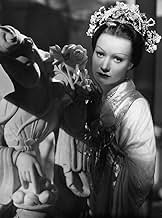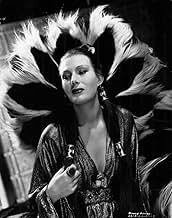AVALIAÇÃO DA IMDb
5,6/10
1,3 mil
SUA AVALIAÇÃO
Adicionar um enredo no seu idiomaAdventurer Marco Polo travels to China, where he finds the Emperor Kublai Khan, court intrigue, danger, and unexpected love.Adventurer Marco Polo travels to China, where he finds the Emperor Kublai Khan, court intrigue, danger, and unexpected love.Adventurer Marco Polo travels to China, where he finds the Emperor Kublai Khan, court intrigue, danger, and unexpected love.
- Direção
- Roteiristas
- Artistas
- Prêmios
- 4 vitórias no total
Robert Greig
- Chamberlain
- (as Robert Grieg)
Richard Alexander
- Ahmed's Aide
- (não creditado)
Reginald Barlow
- Giuseppi - Venetian Business Man
- (não creditado)
Granville Bates
- Venetian Business Man
- (não creditado)
- Direção
- Roteiristas
- Elenco e equipe completos
- Produção, bilheteria e muito mais no IMDbPro
Avaliações em destaque
This is the film that cost LANA TURNER (in a bit role) her eyebrows which never grew back. Other than that, it has no distinction whatsoever except that it provides a nice comic book excursion into the past with lavish sets of Oriental splendor but little else for compensation.
Still, it's watchable enough thanks to the low-key and quietly humorous performance of GARY COOPER (an unlikely choice for the role of the Italian adventurer from Venice). It's also interesting to watch SIGRID GURIE, fascinating in close-ups with Hollywood's brand of Oriental make-up--but an actress who never managed to be more than a passing fancy.
BASIL RATHBONE adds the right touch of menace as Ahmed, the villain of the piece, and ALAN HALE brings his boisterous presence to the role of a man who was afraid of his lecherous wife (BINNIE BARNES) but not afraid to dispose of his enemies in boiling oil.
It gets more laughable as it goes on, but reaches new heights of incredibility with an ending that has Polo making use of explosives to bring down the enemy camp. His final fight to the death with Rathbone, near an open trap door with hungry lions waiting below and vultures overhead, is the stuff of comic book suspense.
If you can suspend all disbelief long enough to enjoy it, it passes the time quickly and entertainingly. A history lesson, it's not.
Still, it's watchable enough thanks to the low-key and quietly humorous performance of GARY COOPER (an unlikely choice for the role of the Italian adventurer from Venice). It's also interesting to watch SIGRID GURIE, fascinating in close-ups with Hollywood's brand of Oriental make-up--but an actress who never managed to be more than a passing fancy.
BASIL RATHBONE adds the right touch of menace as Ahmed, the villain of the piece, and ALAN HALE brings his boisterous presence to the role of a man who was afraid of his lecherous wife (BINNIE BARNES) but not afraid to dispose of his enemies in boiling oil.
It gets more laughable as it goes on, but reaches new heights of incredibility with an ending that has Polo making use of explosives to bring down the enemy camp. His final fight to the death with Rathbone, near an open trap door with hungry lions waiting below and vultures overhead, is the stuff of comic book suspense.
If you can suspend all disbelief long enough to enjoy it, it passes the time quickly and entertainingly. A history lesson, it's not.
This is one of the oddest films to be made in pre-war America. Gary Cooper plays the Venetian explorer, and the film opens in a Venice seemingly constructed of cardboard. Here he is pursued by his comic servant, a sort of cross between a midget and a hyperactive gondolier.
In no time at all, we are in the mysterious realm of Cathay, where the streets are exotic, but seemingly made of cardboard as well. Marco is attracted by a strange voice - these medieval Chinese (or Mongols?)speak with impeccable Oxbridge accents. And this one, oddly enough, is reading to his children on some sort of verandah facing the street. This public recitation is from the New Testament, and Marco immediately completes the phrase, as it were. The placid mandarin figure takes this in his stride, and happens to mention that he is treating his son to a crash course in both eastern and western wisdom - which is not bad for a place that has not yet been visited by a European.
Soon our Gary (er, Marco) is served a mysterious oriental dish called 'spaghet', which he thinks he will introduce to Venice when he returns.
At the royal palace (made of a superior form of cardboard), he is soon immersed in the intrigues of the court of Kublai Khan. After some swashbuckling and some overacting, he falls for a beautiful princess. Alas, she is pledged to another, but our hero is given the task of escorting her to her intended.
And so they sail away into the sunset on a large sea-going junk (!), and he states that he will at least have her to himself for the year long voyage. The film ends on this morally dubious note, and the implication is that he eventually returned with his spaghetti to Venice and opened a restaurant.
In no time at all, we are in the mysterious realm of Cathay, where the streets are exotic, but seemingly made of cardboard as well. Marco is attracted by a strange voice - these medieval Chinese (or Mongols?)speak with impeccable Oxbridge accents. And this one, oddly enough, is reading to his children on some sort of verandah facing the street. This public recitation is from the New Testament, and Marco immediately completes the phrase, as it were. The placid mandarin figure takes this in his stride, and happens to mention that he is treating his son to a crash course in both eastern and western wisdom - which is not bad for a place that has not yet been visited by a European.
Soon our Gary (er, Marco) is served a mysterious oriental dish called 'spaghet', which he thinks he will introduce to Venice when he returns.
At the royal palace (made of a superior form of cardboard), he is soon immersed in the intrigues of the court of Kublai Khan. After some swashbuckling and some overacting, he falls for a beautiful princess. Alas, she is pledged to another, but our hero is given the task of escorting her to her intended.
And so they sail away into the sunset on a large sea-going junk (!), and he states that he will at least have her to himself for the year long voyage. The film ends on this morally dubious note, and the implication is that he eventually returned with his spaghetti to Venice and opened a restaurant.
I don't have much to say about the film; it's another pretty, but merely adequate Hollywood hoo-hoo. But - although the film (of course) plays loose with historical fact - it must be remembered that Marco Polo did it as well, and there is almost no actual record to compare anyone's version of the story against: Polo (like Cellini) was a notorious liar-in-print. It is now assumed that his record of his journey is quite spurious, and written to enhance the glory of his accomplishment. As there is no other extensive record of the journey, there can be precious little "truth" or "fiction" to be be determined about any Marco Polo narrative. Like Cellini, he has "pre-dramatized" his own story.
In itself corny and uneven, this is typical 30s entertainment done on a grand scale; the look of the film is artificial but undeniably lavish. Being a Samuel Goldwyn production, the film is the very antithesis of a history lesson; still, it's more interesting when dealing with the title character's various discoveries in the Orient than his romantic conquests!
Goldwyn, however, could surely afford to employ a reliable cast - most of whom, though, one would be hard-pressed to accept as Chinese - including Gary Cooper (likeable as always in the lead, if not exactly believable), Basil Rathbone (a typically sly villain), Sigrid Gurie (Kublai Khan's daughter and, naturally, an object of contention between Cooper and Rathbone), Ernext Truex (funny as Cooper's flustered sidekick), Alan Hale (a jovial rebel leader) and H.B. Warner (who basically replicates his dignified Chang from LOST HORIZON [1937]). Action is sparse but nicely handled (particularly the climax) and, surprisingly, the montage sequences (a feature of many films of the era) utilize some interesting optical effects.
The IMDb lists the uncredited contribution of two other directors - John Cromwell and John Ford; since the latter's frequent cinematographer Archie Stout does feature in the credits, I'm inclined to believe Ford was involved at some point...though it doesn't really show in the finished product (the subject was hardly up his street, to begin with)! Back in the day, I had watched both the 1965 international epic MARCO THE MAGNIFICENT and the 1982 TV mini-series MARCO POLO; I'll be following this with an Italian low-brow variation made in 1961 (see review below) and might even rent the recent 1998 version, THE INCREDIBLE ADVENTURES OF MARCO POLO (shortened to MARCO POLO for the U.S.) - if only because it features Jack Palance and Oliver Reed, and was written by Harry Alan Towers!
Goldwyn, however, could surely afford to employ a reliable cast - most of whom, though, one would be hard-pressed to accept as Chinese - including Gary Cooper (likeable as always in the lead, if not exactly believable), Basil Rathbone (a typically sly villain), Sigrid Gurie (Kublai Khan's daughter and, naturally, an object of contention between Cooper and Rathbone), Ernext Truex (funny as Cooper's flustered sidekick), Alan Hale (a jovial rebel leader) and H.B. Warner (who basically replicates his dignified Chang from LOST HORIZON [1937]). Action is sparse but nicely handled (particularly the climax) and, surprisingly, the montage sequences (a feature of many films of the era) utilize some interesting optical effects.
The IMDb lists the uncredited contribution of two other directors - John Cromwell and John Ford; since the latter's frequent cinematographer Archie Stout does feature in the credits, I'm inclined to believe Ford was involved at some point...though it doesn't really show in the finished product (the subject was hardly up his street, to begin with)! Back in the day, I had watched both the 1965 international epic MARCO THE MAGNIFICENT and the 1982 TV mini-series MARCO POLO; I'll be following this with an Italian low-brow variation made in 1961 (see review below) and might even rent the recent 1998 version, THE INCREDIBLE ADVENTURES OF MARCO POLO (shortened to MARCO POLO for the U.S.) - if only because it features Jack Palance and Oliver Reed, and was written by Harry Alan Towers!
It's quite an expedition to go to China,if we are to believe the screenwriters!Today,Venice ,and the lovely women Marco ,a womanizer as irresistible as Casanova,seduces,and tomorrow,no problem ,we are in a Chinese village where a wise man reads the Bible to children ("are you a Christian?-No,but I want'em to be carefully taught and be aware of all religions around the world ";relevant today and even a lesson to be remembered in our troubled times)
A cheap expedition :only two persons (Marco and some kind of dwarf ,here to provide the story with a comic relief ) and not a long and winding road full of ambushes or dangers .As easy as to go from the Doges Palace to Marco's uncle's mansion .(The uncle is just passing by)
It's very pleasant though.Gary Cooper is handsome and his charm is as effective in China as it is in Venice (or in America);there is a very tongue-in -cheek side that sustains the interest throughout:Marco suggests he "test" the women,before a khan shocked by his brazenness;the princess ,reciting all his family tree to play for time and thus not to marry the ugly villain,the ending with a dubious moral ,which people with a dirty mind might take for a future menage à Trois.
A cheap expedition :only two persons (Marco and some kind of dwarf ,here to provide the story with a comic relief ) and not a long and winding road full of ambushes or dangers .As easy as to go from the Doges Palace to Marco's uncle's mansion .(The uncle is just passing by)
It's very pleasant though.Gary Cooper is handsome and his charm is as effective in China as it is in Venice (or in America);there is a very tongue-in -cheek side that sustains the interest throughout:Marco suggests he "test" the women,before a khan shocked by his brazenness;the princess ,reciting all his family tree to play for time and thus not to marry the ugly villain,the ending with a dubious moral ,which people with a dirty mind might take for a future menage à Trois.
Você sabia?
- CuriosidadesThe film did poorly at the box-office, becoming the biggest flop up to that time for both Gary Cooper and Samuel Goldwyn; it was estimated that it lost close to $700,000.
The film was criticized for many reasons but chief among them was the casting of Gary Cooper in the lead role - many felt the part called for a brash, swashbuckling hero rather than the low-key cowboy persona that Cooper exemplified. It is interesting to note, then, the man who first brought the idea to Goldwyn: swashbuckler extraordinaire Douglas Fairbanks.
- Erros de gravaçãoWhen Marco crosses a bridge, his party is attacked and his horse is driven over a cliff. A safety wire is clearly visible on the rider.
- Citações
Chen Tsu: You have never seen food like this before?
Marco Polo: No. What is it? Snakes?
Chen Tsu: No! No, it has been eaten by the poor people in China for generations. We call it 'spah- get'.
- Cenas durante ou pós-créditosOpening credits prologue: FOREWORD: Marco Polo lived in Venice seven hundred years ago. He was the first European to visit China and write the story of his adventures in that land of magic and mystery.
He was also the first traveling salesman. . . . . . .
- ConexõesFeatured in History Brought to Life (1950)
Principais escolhas
Faça login para avaliar e ver a lista de recomendações personalizadas
- How long is The Adventures of Marco Polo?Fornecido pela Alexa
Detalhes
- Data de lançamento
- País de origem
- Idioma
- Também conhecido como
- The Adventures of Marco Polo
- Locações de filme
- Empresa de produção
- Consulte mais créditos da empresa na IMDbPro
Bilheteria
- Orçamento
- US$ 2.000.000 (estimativa)
- Tempo de duração
- 1 h 44 min(104 min)
- Proporção
- 1.37 : 1
Contribua para esta página
Sugerir uma alteração ou adicionar conteúdo ausente


